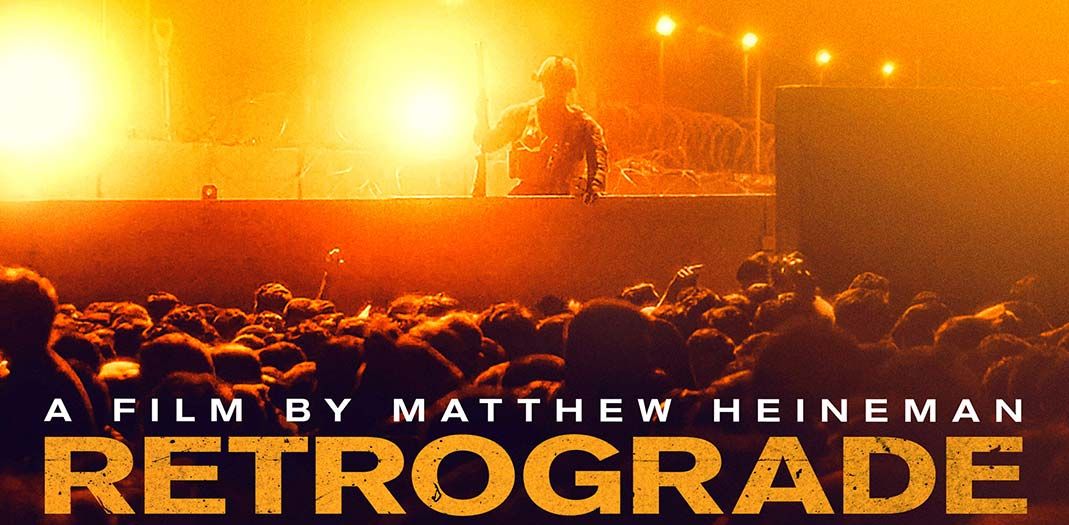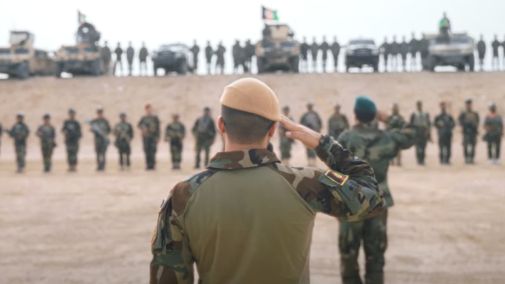Doc Corner: 'Retrograde'
 Friday, November 11, 2022 at 3:00PM
Friday, November 11, 2022 at 3:00PM By Glenn Dunks

Retrograde is the best movie that Matthew Heineman has made. At least from those I have seen. I’ve been critical of this American director in the past for taking the somewhat lazy non-fiction critical expression “it plays like a real-life thriller” too literally, making movies like Cartel Land and City of Ghosts that put themselves above the subject. I never saw his dramatic feature A Private War with Rosamund Pike, but it didn’t surprise me that Heineman had made that leap.
This film, his third in as many years, thankfully takes something of a step back from what appeared to be his natural directorial instincts. For the most part, Retrograde is in service of its subjects and not the filmmaker.
Maybe I was just feeling generous this time? Who can tell, really. But in telling the story of the fall of the Afghanistan capital, Kabul, to ISIS through the final months of American occupation, there is a gravity that made me sit up. Heineman and his co-editors Timothy Grucza and Olivier Sarbil actually do away with the Americans and their green berets quite early, leaving the narrative to focus on Afghan National Army general Sami Sadat and his own team of Afghan soldiers. Thankfully, the editing has slowed down and the camera lingers on interesting frames. When a drone strike attack kills an Afghan man (Taliban or otherwise) early in the film, we do hear some cheers, but it mostly avoids looking like a Michael Bay movie. Preferring as it does instead to look at those whose faces show the briefest of anguish when otherwise showing no emotion at all. That’s what makes this what made Retrograde immediately more interesting to me.

Similarly, it is a movie that feels critical of the United States’ government and their choices in ending their occupation of Afghanistan, while also not letting it consume the narrative. Audiences will no doubt gather much of Heineman’s feelings on the matter from the way he chooses to frame these early scenes of departure through the ever-escalating sense of foreboding horror as Sadat and his army fight a battle that looks increasingly impossible to win. Through to the tragic scenes at the Kabul airport that stirred the world’s attention (however briefly) and that also conclude the film, Retrograde is a film that is politically damning of decisions that saw this American war get twisted into something else it hadn’t been before. It charts the rolling effects as they happened, toppling Sadat’s efforts like dominos one right after the other. Effects that are still being felt in Afghanistan and also throughout the world.
At its best, Heineman is able to show how these men at war interact with one another. Not too dissimilarly to Restrepo, my favourite war documentary in quite a many years, the embedding of a filmmaker’s camera into their ranks makes for curious interactions and insights into male millenarianism. In one of its more fascinating scenes, a mini play of sorts unfolds between two men of different rank and two very different ways of viewing their worsening situation. In another, we cascade of men’s faces as the realisation of what they’re being asked to do as it goes against their better instincts.
The image that closes the movie (a brief 94 minutes) is that of a woman, headscarf on, looking through a wire gate at Kabul Airport with a look that signifies all at once worry, anger, annoyance, disassociation and the panic of knowing your life will likely never be the same again. It’s one of the best final shots of a movie in 2022 and symbolises so much of what I appreciated about the movie. This is gut-wrenching stuff and while I am sure we will see several films about this subject yet that give us other unique and likely more comprehensive and/or introspective perspectives, Retrograde succeeds by allowing its story to emerge with economy and with an eye to ensuring viewers understand how just a few small choices can take entire countries backwards.
Release: In limited theatres from today with more expansions to come. It will later premiere on National Geographic December 8 and on Disney+ on December 9/Hulu December 12.
Award chances: Very strong. National Geographic acquire good stuff and apparently know how to sell it well to the Academy. Heineman is already a nominee, and he has been shortlisted since, too. I suspect this will make the 15-wide shortlist and would feel like a good shot at a nomination. Is the subject matter what’s appealing to the branch right now, though? Hard to tell.
 Doc Corner,
Doc Corner,  Retrograde,
Retrograde,  Review,
Review,  documentaries
documentaries 


Reader Comments (1)
The image that appears at the end of the movie (which only lasts 94 minutes) is of a woman wearing a headscarf and looking through a wire gate at Kabul Airport with a look that conveys all of the emotions associated with the realization slope game that your life is likely never going to be the same again: worry, anger, annoyance, disassociation, and panic.